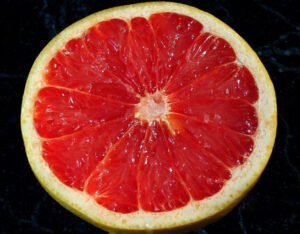Medically reviewed by Dr. Ramesh Gaddam, M.D. — Written by Sumalatha, D.N.H.E
6. Herbs to Avoid While Taking Mirtazapine
Certain herbs can interact with Mirtazapine and potentially cause side effects or affect how well the medication works. Here are some herbs to avoid:
1. St. John’s Wort
This herb is often used to treat depression, but it can reduce the effectiveness of Mirtazapine and increase the risk of side effects.
Avoid St. John’s Wort while taking Mirtazapine unless your doctor approves it.
2. Ginkgo Biloba
Ginkgo Biloba may affect blood clotting and increase the risk of bleeding, especially if combined with Mirtazapine.
Consult your doctor before using Ginkgo Biloba or any supplement containing it.
3. Kava Kava
Kava Kava can increase sedation and interact with Mirtazapine, leading to excessive drowsiness or impaired motor function.
Avoid Kava Kava to prevent these interactions and potential side effects.
4. Valerian Root
Used to promote sleep, Valerian Root can enhance the sedative effects of Mirtazapine, potentially causing excessive drowsiness or impaired cognitive function.
Consult with your healthcare provider before taking Valerian Root.
5. Licorice Root
Licorice Root can cause issues with blood pressure and interact with Mirtazapine, potentially leading to unwanted side effects.
Avoid Licorice Root or discuss its use with your doctor.
6. Echinacea
Echinacea may influence liver enzymes that process Mirtazapine, altering its effectiveness or increasing side effects.
Consult your healthcare provider before using Echinacea.
Always check with your doctor before starting or stopping any herbal supplements while taking Mirtazapine to ensure they do not interfere with your treatment.
7. Certain Medications
Mirtazapine can interact with other medications, affecting its effectiveness or leading to adverse effects.
MAO inhibitors, some antibiotics, other antidepressants.
Inform your healthcare provider of all medications and supplements you’re taking.
Who Should Not Take Mirtazapine?
Mirtazapine may not be suitable for everyone. Here are some groups of people who should avoid taking this medication or use it with caution:
1. Individuals with Severe Allergies to Mirtazapine
Severe allergic reactions can occur in some people, leading to symptoms such as rash, itching, or swelling. Avoid Mirtazapine if you have a known allergy to it.
2. People with Certain Mental Health Conditions
Those with bipolar disorder or a history of manic episodes should be cautious, as Mirtazapine can trigger manic or hypomanic states. Discuss your mental health history with your doctor to determine if Mirtazapine is appropriate.
3. Individuals with Liver or Kidney Problems
Mirtazapine is processed by the liver and kidneys, so severe liver or kidney disease may affect its clearance from the body.
People with liver or kidney issues should use Mirtazapine only under medical supervision.
4. Pregnant or Breastfeeding Women
The effects of Mirtazapine during pregnancy and breastfeeding are not fully understood, and it may affect the baby.
Consult your doctor if you are pregnant, planning to become pregnant, or breastfeeding.
5. Individuals Taking Certain Medications
Mirtazapine can interact with other medications, such as MAO inhibitors, certain antibiotics, and other antidepressants.
Inform your doctor about all the medications you are taking to avoid harmful interactions.
6. People with Glaucoma
Mirtazapine may increase intraocular pressure, which could worsen glaucoma.
Discuss your eye health with your doctor before starting Mirtazapine.
Always consult with your healthcare provider before starting or stopping Mirtazapine to ensure it is safe and suitable for your specific health needs.
Safety Dietary Practices While Taking Mirtazapine

To make sure Mirtazapine works well and to avoid side effects, follow these dietary tips:
- Keep track of your weight since Mirtazapine can increase your appetite and lead to weight gain.
- Choose low-calorie, nutritious foods like fruits, vegetables, and lean meats.
- Avoid foods high in tyramine, such as aged cheeses and cured meats, which can raise blood pressure.
- Limit caffeine to avoid affecting your sleep and increasing anxiety, and skip alcohol to prevent added drowsiness.
- Watch out for high-sodium foods, which can worsen weight gain and blood pressure.
- Drink plenty of water to stay hydrated, and eat balanced meals regularly to keep your blood sugar steady.
- Consider talking to a dietitian for personalized advice. Always check with your doctor before making any big changes to your diet.
Recommended Foods for Mirtazapine Users
Choosing the right foods while taking Mirtazapine can help manage side effects and support overall health. Here are some recommended foods to include in your diet:
1. Fruits and Vegetables
They provide essential vitamins, minerals, and fiber, which support overall health and can help manage weight.
Apples, berries, oranges, leafy greens, carrots, and broccoli.
2. Lean Proteins
Lean proteins help build and repair tissues, and they can keep you feeling full longer.
Chicken breast, turkey, tofu, legumes, and fish.
3. Whole Grains
Whole grains offer sustained energy and help maintain stable blood sugar levels.
Brown rice, quinoa, oats, whole wheat bread, and whole grain pasta.
4. Low-Fat Dairy or Alternatives
Provides calcium and vitamin D without excess calories or fat.
Low-fat yogurt, skim milk, almond milk, and fortified plant-based milk.
5. Nuts and Seeds
These are good sources of healthy fats, protein, and fiber.
Almonds, walnuts, chia seeds, and flaxseeds.
6. Hydrating Foods
Helps with hydration and can aid in digestion.
Cucumbers, watermelon, oranges, and celery.
7. Herbal Teas
Non-caffeinated and can aid relaxation and hydration.
Chamomile, peppermint, and rooibos tea.
8. Low-Sodium Foods
Helps manage blood pressure and reduces the risk of fluid retention.
Fresh or frozen vegetables, low-sodium canned goods, and unsalted nuts.
9. Foods High in Omega-3 Fatty Acids
Supports brain health and can help manage mood.
Fatty fish like salmon, flaxseeds, and walnuts.
10. Foods Rich in B Vitamins
Supports energy levels and overall mood.
Eggs, leafy greens, whole grains, and beans.
When to See a Doctor?
If you experience unusual symptoms like severe headaches, dizziness, rapid weight gain, or high blood pressure while taking Mirtazapine, it’s important to see your doctor right away.
These could be signs of a food interaction or a side effect that needs attention.
Additionally, if you’re unsure about certain foods or drinks and how they may affect your medication, consult your healthcare provider.
Regular check-ups and open communication with your doctor can help keep you safe and ensure your treatment is effective.
Frequently Asked Questions (FAQs)
What Can I Not Eat with Mirtazapine?
When taking Mirtazapine, avoid foods high in tyramine such as aged cheeses, cured meats, and fermented products.
These can raise blood pressure and cause adverse reactions. Also, avoid grapefruit and its juice, as it can increase the medication’s effects.
Who Cannot Take Mirtazapine?
Mirtazapine is not recommended for individuals with severe liver or kidney problems, a history of bipolar disorder, or those allergic to its ingredients.
Pregnant or breastfeeding women should consult their doctor before use.
What Organ Does Mirtazapine Affect?
Mirtazapine primarily affects the brain by altering neurotransmitter levels, particularly serotonin and norepinephrine.
However, it may also impact liver function, so regular monitoring is advised for individuals with liver issues.
Can You Take Mirtazapine After Food?
Yes, you can take Mirtazapine with or without food. It is often recommended to take it at bedtime due to its sedative effects, regardless of whether you’ve eaten.
Does Mirtazapine Make You Hungry at Night?
Yes, Mirtazapine is known to increase appetite, which can lead to nighttime cravings. This side effect can contribute to weight gain if not managed.
Will I Ever Sleep Again After Mirtazapine?
Yes, Mirtazapine is often prescribed for its sedative effects, helping many people with sleep issues. However, if you have trouble sleeping, consult your doctor to adjust the dosage or timing.
Can I Stop Mirtazapine After 2 Months?
You should not stop taking Mirtazapine suddenly after two months or any other time without consulting your doctor. Stopping abruptly can lead to withdrawal symptoms like nausea, headaches, and mood swings.
What Strength of Mirtazapine is Best for Sleep?
Mirtazapine is typically prescribed in doses ranging from 15 mg to 45 mg. The lower doses, around 15 mg, are usually more sedating and effective for sleep.
Why Don’t Doctors Prescribe Mirtazapine?
Doctors may avoid prescribing Mirtazapine for certain patients due to its side effects, such as weight gain, drowsiness, or the risk of serotonin syndrome when combined with other medications.
What Are the Positive Effects of Mirtazapine?
Mirtazapine helps improve mood, reduce anxiety, and manage symptoms of depression. It is also commonly used to aid sleep and increase appetite in patients who need it.
Who Needs Mirtazapine?
Mirtazapine is typically prescribed to individuals with depression, anxiety, or sleep disorders. It may also be used to help those struggling with a loss of appetite or weight loss due to illness.
Does Mirtazapine Affect Memory?
Memory issues are not common with Mirtazapine, but some individuals may experience mild cognitive effects, including difficulty concentrating. If memory problems arise, consult your doctor.
Does Mirtazapine Cause Hair Loss?
Hair loss is not a common side effect of Mirtazapine, though it has been reported in some cases. If you notice unusual hair loss, it is important to discuss this with your healthcare provider.
Is Mirtazapine a High-Risk Medication?
Mirtazapine is generally considered safe when used as prescribed, but it can have risks, especially in elderly patients or those with certain medical conditions. Risks include sedation, weight gain, and increased cholesterol.
What Part of the Brain Does Mirtazapine Affect?
Mirtazapine affects the neurotransmitters serotonin and norepinephrine in the brain, helping to improve mood and alleviate anxiety. These chemicals are involved in regulating mood, sleep, and appetite.
What is the Lowest mg of Mirtazapine?
The lowest dose of Mirtazapine typically prescribed is 7.5 mg. This dose is usually used to manage mild symptoms or as a starting dose for those sensitive to medications.
What is the Best Anxiety Tablet?
There isn’t a one-size-fits-all answer to the best anxiety medication, as it depends on the individual’s needs. Common medications include SSRIs, SNRIs, and benzodiazepines, with Mirtazapine also being used for anxiety in some cases.
Can Mirtazapine Cause Eye Problems?
Eye problems like blurred vision can occur with Mirtazapine, although this is not common. If you experience persistent eye issues, it’s important to contact your doctor.
References:
[1] https://www.healthtimes.co.uk/food-nutrition/foods-to-avoid/are-there-any-foods-to-avoid-while-taking-mirtazapine
[2] https://cabinethealth.com/blogs/journal/a-comprehensive-list-of-foods-to-avoid-when-taking-mirtazapine
[3] https://www.nhs.uk/medicines/mirtazapine/side-effects-of-mirtazapine/
[4] https://www.medicalnewstoday.com/articles/mirtazapine-oral-tablet
[5] https://www.ncbi.nlm.nih.gov/books/NBK519059/
[6] https://go.drugbank.com/drugs/DB00370
[7] https://www.nhs.uk/medicines/mirtazapine/common-questions-about-mirtazapine/
[8] https://blocked.goodrx.com
Also Read:
15 Foods to Avoid with Gallbladder Issues (Gallstones)
Rosuvastatin: 7 Long-term Side Effects of Rosuvastatin
Metformin: 8 Specific Foods to avoid while taking Metformin
5 Foods to Avoid while taking Nitrofurantoin (Macrodantin)
Glipizide: 10 Foods to avoid while taking (Glucotrol)
Cymbalta: 7 Foods to Avoid while taking Cymbalta(Duloxetine)
Medically reviewed by Dr. Ramesh Gaddam, M.D.

General Physician, Diabetologist, and Critical Care Specialist.









Pingback: 8 Foods to Avoid when taking Anastrozole (Estrogen Reducer)
Pingback: Lamotrigine: 7 Foods to Avoid When Taking Lamotrigine
Pingback: 9 Essential Foods to avoid When Taking Flecainide